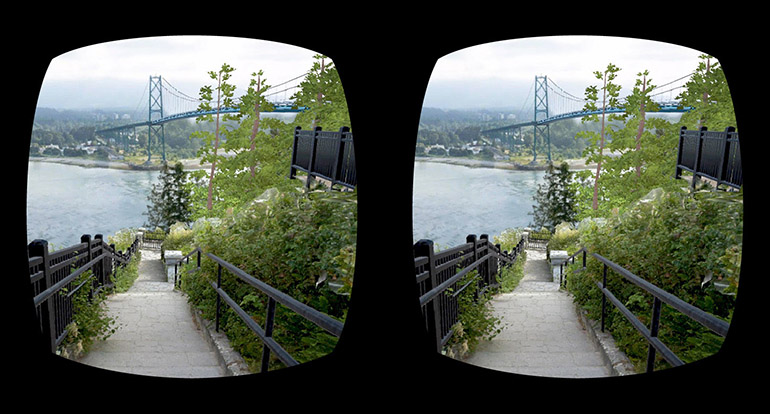
A virtual reality project on Stanley Park’s geography is being touted as an early success of UBC’s Emerging Media Lab, utilizing multi-disciplinary students and faculty in a collaborative effort.
Field trips are pivotal for geography students to enhance their knowledge and understanding in their area. However, study sites are not always easily accessible, nor is funding available. With an effort to make experiential learning more accessible, the Stanley Park Geography Virtual Reality Field Trip provides a fully interactive virtual space for students to learn about their surroundings. The project drew from across campus involving students from multiple faculties, faculty and teaching fellows from UBC Geography, UBC Studios staff, and industry experts (MetanautVR) at UBC’s Emerging Media Lab (EML).
Started in 2016, the project was funded by a UBC Teaching and Learning Enhancement Fund and through a BCcampus Open Education grant. As no one had attempted to build such an environment before, the team learned on the go through experimentation with new technology, ground level photogrammetry, drones, 3D modelling applications, and the Unity game engine. When wearing VR goggles, users are immersed in a 3D spatial environment of Stanley Park with highly interactive elements where they can travel through time and space, personalize their experience, and explore the history of one of West Coast’s most iconic parks.
“We are moving away from the typical traditional means of classroom teaching and exploring other ways of using technology to enhance learning both inside and outside of the classroom,” says Loch Brown, Senior Instructor, Geography Department.
This is one of the first projects produced in EML, an experiential space created in collaboration by UBC Information Technology with various units at UBC, intended for faculty, students, and staff from all disciplines to evolve learning by creating tools and techniques using emerging media.
To ensure this project was also a student learning experience, approximately 70 to 80 percent of the content and technical coding was developed by students.
Theresa Kikuchi, a second year Cognitive Science student, who worked on the project said she developed an entirely new set of skills. “I liked the vision of the project and thought it was a really cool concept. Prior to working on this project, I didn’t have any background on designing virtual environments. I am now transferring the knowledge and skills I learned from the project to another EML project.”
“For me, I will be taking away a lot of problem solving skills from working on this project. I might not understand what I’m tasked to do at the moment, but I know that as long as I am dedicated to learning it on the spot, I can figure it out,” says Luke Schuster, a fourth year student studying a double major in Microbiology and Immunology and Computer Science.
This project is now evaluating the educational effectiveness of the interactive VR experience with students at partner institutions across the province. The resulting openly licensed code and VR experience will be publicly shared so that other institutions can use and learn from this groundbreaking work.
For more information on this project, please visit http://eml.ubc.ca/projects/geography-vr/
